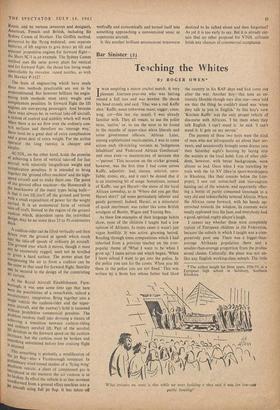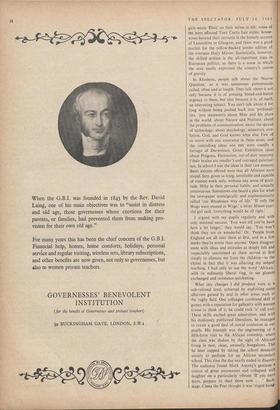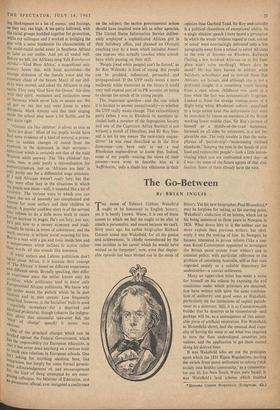Bar Sinister (2)
Teaching the Whites
By ROGER OWEN* wAs umpiring a minor cricket match. A very
pleasant fourteen-year-old who was batting missed a full toss and was bowled. He shook his head crossly and said. That was a real Kaffir shot.' Kaffir, noun (otherwise nutnt; nigger; coon; wog; zot—this last via tsotsi). I was already familiar with. They all meant. to use the polite term, 'native,' or, to use the term to be found in the mouths of upper-class white liberals and some government officials. 'African. Later, among sophisticated reactionaries, 1 was to come across such rib-tickling variants as 'indigenous inhabitant' and 'Federated African Gentleman' and once even—a masterstroke of sarcasm this =partner.' This occasion on the cricket ground, however, was the first time I had come across Kaffir, adjective: bad, clumsy, inferior, unre- liable, comic, etc., and it can't be denied that it is an interesting bit of usage. Sometimes, instead of Kaffir, one got Harari—the name of the local African township, as in 'Where did you get that Harari shirt?' (of some particularly inferior and gaudy garment). Indeed, Harari, as a stimulator of quick merriment, was rather like some British amalgam of Bootle, Wigan and Tooting Bee.
As these few examples of their language habits show, most of the children I taught had a low opinion of Africans. In many cases it wasn't just vague hostility. It was active, gnawing hatred. Reading through some compositions which I had inherited from a previous teacher on the ever- popular theme of 'What I want to be when I grow up,' I came across one which began, 'When I leave school I want to get into the police. In the police you can hit the coons. When you hit them in the police you are not fined.' This was written by a Scots boy whose father had liked
the country in his RAF days and had come out after the war. Another boy—this time an ex- tremely likeable though very dim one—once told me that the thing he couldn't stand was 'when they talk to you in English.' In this boy's view 'Kitchen Kaffir' was the only proper vehicle of discourse with Africans. 'I hit them when they talk English. I can't stand it,' he said. '1 can't stand it. It gets on my nerves.'
The parents of these two boys were the kind of men who not infrequently set about their ser- vants, and occasionally brought some drama into their Saturday night's boozing by laying into the waiters at the local hotel. Lots of other chil- dren, however, with better backgrounds, were almost as bad. Once when I was travelling by train with the 1st XV (they're sport-worshippers in Rhodesia, like their cousins below the Lim- popo), I saw our scrum-half and vice-captain leaning out of the window, and apparently offer- ing a bottle of partly consumed lemonade to a very old and indescribably tattered African. When the African came forward, with his hands up- stretched towards the window, its contents were neatly syphoned into his face, and everybody had a good, spirited, rugby-player's laugh.
I cannot say whether these were completely typical of European children in the Federation, because the suburb in which I taught was a com- paratively poor one. There was a bigger-than- average Afrikaans population there and a smaller-than-average proportion from the profes- sional classes. Culturally, the place was not un- like any English working-class suburb. The little
*The author taught for three years, 1956-59, in a European high school in Salisbury, Southern Rhodesia.
'What irritates nit most is that while we were building it they said it was for low-cost • public housing!'
girls wrote 'Elvis' on their wrists in ink; some of the boys affected Tony Curtis hair styles; house- wives berated their servants in the homely accents of Lancashire or Glasgow, and there was a good market for the yellow-backed jumbo edition of the overseas Daily Mirror. Statistically, however, the skilled artisan is the all-important man in European politics, so there is a sense in which the area neatly expressed the country's centre of gravity.
In Rhodesia, people talk about the 'Native Question,' as it was sometimes portentously called, often and at length. They talk about it not only because it is of pressing bread-and-butter urgency to them, but also because it is, of itself, an interesting subject. You can't talk about it for long without being pushed back into 'profundi- ties, into statements about Man and his place in the world, about Nature and Nurture, about the problems of comrhunication. about the spread of technology, about psychology, semantics, evo- lution, God, and God knows what else. Few of us move with any assurance in these areas, and the controlling ideas one met were usually a farrago of Darwinism. Great Exhibition ideas about Progress, Puritanism, out-of-date anatomy ('their brains are smaller') and outraged paternal- ism. In school I met the ideas in their raw essence. Basic axioms offered were that all Africans were stupid, lazy, given to lying, unreliable and capable of routine work only. without any sense of grati- tude, filthy in their personal habits, and sexually omnivorous. Sometimes one heard a plea for what the newspaper nostalgically and euphemistically called 'our Rhodesian way of life.' If only the Wogs were treated as Wogs,' a bitter fifteen-year- old girl said, 'everything would be all right.'
I argued with my pupils regularly and with only minimal success. 'You wait till you've been here a bit longer,' they would say. 'You won't think they are so wonderful.' Or, 'People front England are all over then, at first, and in a few weeks they're worse than anyone.' Open disagree- ment with ideas and attitudes as deeply felt and respectably sanctioned as these served at first simply to alienate me from the children—to the extent in fact that it was affecting my subject teaching. I had only to use the word 'African, with its militantly liberal ring, to see glances exchanged and resistance quickening.
What tiny changes I did produce were at a sub-rational level, achieved by exploiting some affection gained by zeal in other areas, such as the rugby field. One colleague combined skill at games with a reputation for gallantry with women (come to think of it, he could rock 'n' roll ton). These skills excited great admiration, and with his studiously publicised liberalism, he managed to create a good deal of moral confusion in our pupils. His triumph was the engineering of a fifth-form visit to the African township, where the class was shaken by the sight of Africans living in neat, clean, unsmelly bungalows. This be later capped by taking the , school dramatic society to perform for an African secondarY school. This time the day nearly ended in disaster. The audience found Mark Antony's gestures a source of great amusement and collapsed with laughter on a particularly vibrant 'If you have tears, prepare to shed them now. . . Back' stage, Cinna the Poet thought it was 'stupid bring' lng Shakespeare to a lot of muffs,' and feelings, as they say, ran high. A tea-party followed, with the racial groups huddled together for protection, While my colleague and I worked at bridging the gap with a tense bonhomie (so characteristic of the multi-racial social event in Southern Africa) as false as our smiles. And yet all ended well. Before we left, the Africans sang Ishi Komberere Afrika'—`God Bless Africa,' a magnificent mis- sionary hymn this, with local accretions—the strange ululation of the female voice and the resonant chant of the basses. Many of our chil- dren were moved, and asked the Africans to sing again. They sang 'God Save the Queen,' this time With that spirit, resonance and instinctive sense Of harmony which never fails to amaze me. We all got on our bus and went home to white Rhodesia, Mark Antony said that their singing made the school play seem a bit feeble, and he was quite right.
'Africans are like children' is about as true as Scots are dour.' Most of my pupils would have had some evidence of a kind of naïveté, a prone- ness to sudden changes of mood from the euphoric to the depressed, in their servants— behaviour which is certainly not that of the staid Western adult anyway. The 'like children' for- nuda, then, is only partly a rationalisation for authoritarianism, just as 'Africans are lazy' is 014 partly one for a differential wage structure. Ifi said Africans weren't really lazy, but that they were often lazy in the situations in which mY pupils saw them—well, it sounded like a bit of casuistry. The various ways in which you can argue this are of necessity too complicated and remote for most settlers and their children to fullow. A popular cookboy story is of the servant Who refuses to do a little more work in return for an increase in wages. He's not lazy, you say; s just new to a money economy and tradi- tionally he thinks in terms of subsistence; and the Work, anyway, is without social meaning for him. nut to a man with a gin and tonic inside him and a temperament which inclines to action rather than words all this sounds like nonsense.
If white settlers and Labour politicians don't agree about Africa, it is because their concept of The African' is based on different experiences ,nd different needs. Broadly speaking, they differ In experience since the settler knows only his cr,°°khoY, while politicians tend' to know only ..uroPeanised African politicians. We know why Ile settler needs the picture which he in part receives and in part creates. Less frequently remarked, however, is the Socialists' built-in need id esPeeiallY nowadays—for a deprived and ealised proletariat, though (observe the indigna- !tort about that successful take-over bid, the wind of change' speech) it seems very obvious.
One of the principal charges which can be ivelled against the Federal Government, which as the responsibility for European education, is 'nal it has never done anything on a serious scale to teach race relations in European schools. One t asking for anything idealistic here, like Integration, but simply for some formal govern- Tent acknowledgement of, and encouragement ler., the kind of thing attempted by my enter- !rising colleague. No Minister of Education, and 40 permanent official, ever instigated a conference on the subject; the tactics governmental action should have inspired were left to other agencies. The United States Information Service deliber• ately employed a sophisticated African girl in their Salisbury office, and planned an Olympic coaching tour by a team which included Ameri- can negroes who actually touched white school- boys while passing on their skill.
'People [read white people] can't be forced,' as Sir Roy Welensky is fond of saying. But people can be prodded, influenced, persuaded and propagandised. If the UFP really wants a more malleable white electorate in the future it could very well expend part of its PR account on trying to change the minds of its young people.
The important question—and the one which it is hardest to answer unequivocally—is whether the UFP really wants change. That extraordinary party (when I was in Rhodesia its members in- cluded both a member of the Segregation Society and one of the Capricorn Africa Society) is not without a streak of liberalism, and Sir Roy him- self is not by any means 'the race-crazy engine- driver' he was once described as in the New Statesman—you have only to see a real Rhodesian engine-driver to know that. Indeed, some of my pupils—voicing the views of their parents—were wont to describe him as a latfirboetie,' only a shade less villainous in their opinion than Garfield Todd. Sir Roy undoubtedly is a political chameleon of exceptional ability. • In a single election speech I have heard a peroration in which the words 'without regard to race, colour or creed' were convincingly delivered only a few paragraphs away from a refusal to admit Africans to the role of firemen on Rhodesia Railways (letting a few hundred Africans on to the foot- plate won't solve anything'). Where does he stand? He has been known to address white Salisbury schoolboys and to remind them that Africans are human, and although this is not a profound insight, it is something worth hearing from a man whose childhood was spent at a time when the fact was systematically forgotten. Looked at from the strange vantage-point '.)t a Right-wing white Rhodesian suburb. populated to a large extent (and this unfortunate fact must be recorded) by recent ex-members of the British working lower middle class, Sir Roy's picture of himself as a middle-of-the-road statesman, harassed on all sides by extremists, is a not im- plausible one. The only trouble is that the meta- physics of 'partnership'—`maintaining civilised standards,' keeping the vote in the hands of civi- lised and responsible people'—look a little uncon- vincing when you are confronted every day—as I was—by some of the future agents of that civi- lisation. Some of them already have the vote.




































 Previous page
Previous page